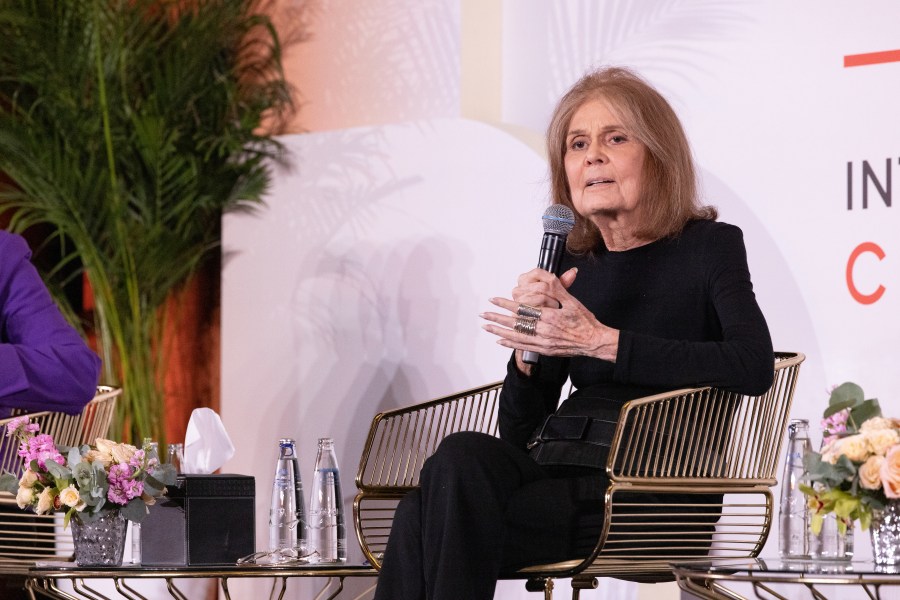Over the past 50 years, Ms. Magazine has challenged the status quo and has been one of the country’s most influential sources of feminist ideas.
It was one of the first U.S. magazines to feature prominent American women demanding the repeal of laws that criminalized abortions, advocate for the Equal Rights Amendment, feature domestic violence and sexual harassment on is cover, rate presidential candidates on women’s issues and commission and publish a national study on date rape.
In honor of the 50th anniversary of the magazine, the most ground-breaking pieces have been compiled into a new book, “50 Years of Ms.: The Best of the Pathfinding Magazine That Ignited a Revolution.” It was edited by Ms. Magazine executive editor Katherine Spillar and includes a foreword by Ms. Magazine co-founder and feminist activist Gloria Steinem. The book features equal rights legends, including Billie Jean King, Alison Bechdel, Audre Lorde, Barbara Ehrenreich, Michele Wallace, Minh-Ha T. Pham and more.

Know Your Value recently chatted with Spillar about the book, Ms. Magazine’s legacy, and the biggest lessons we can learn going forward. Below is the interview, which has been edited for brevity and clarity:
Know Your Value: Ms. Magazine has played a pivotal role in bringing feminism and women’s rights into the mainstream. Tell us about the process of going through five decades (!) of material and selecting what to include in this book to really capture the enormous and complicated history of gender equity.
Katherine Spillar: To say it was difficult would be – well – an understatement! We literally reviewed 50 years’ worth of Ms. magazines, focusing on selecting the most ground-breaking, norm-breaking articles to show how the movement for women’s equality, its ideas and the problems women face in the U.S. and globally, have evolved over the past 50 years.
The book features articles on the aspects of women’s lives the magazine both chronicled and explored over its 50 years: pieces on politics (sexual and otherwise), men, marriage, family, education, work, motherhood, child-rearing, violence, and reproductive rights, and how sexism, racism and homophobia are intertwined and universal. And in addition to the articles themselves, we were looking for the iconic covers, examples of letters to the editor and behind the scene photos. And we looked for pieces that reflected what Ms. did best – connect its readers to the activism of the movement – to the organizations locally and globally working to advance women’s equality…
Know Your Value: Tell us about one or two of your favorite pieces in the book and why they matter.
Spillar: One of my favorites is a piece by Lois Gould from the December, 1972 issue of Ms., “X: A Fabulous Child’s Story.” It’s a fictionalized account of a “Secret Scientific X-periment” in non-sexist child-rearing. The parents of “X” were provided with an instruction manual numbering into the thousands of pages with hundreds of examples for treating X properly and which they regularly consulted for help in solving all the problems they faced including responding to other adults and children confused with how to interact with X without knowing X’s sex. It’s a story filled with humor but raises profound questions about how culture determines identify and boxes us all in to stereotypes of what it means to be male or female. Ms. magazine would go on to publish a series called “Stories for Free Children” and a regular holiday gift guide filled with toys that are “nonracist and nonsexist in the way [they are] packaged, conceived, and planned for play.”
And of course, I always loved Gloria Steinem’s essay from 1978, “If Men Could Menstruate.” As we explain in the book, her essay imagined a host of policies that “seemed far-fetched at the time – among these, that menstrual products would be covered by federal funds and freely available. Today these reforms are at the heart of a global movement and legislative campaign.”

Know Your Value: What do you think was the most influential piece Ms. ever published that was included in this book?
Spillar: It’s impossible to name only one – of course, in its first issue in 1972, Ms. ran the groundbreaking “We Have Had Abortions” petition which listed more than 50 prominent women who dared to sign their name to a public manifesto demanding the legalization of abortion. The Washington Post recently said the petition “changed the course of the abortion rights movement by making visible the women who had abortions …” The petition has since spurred additional petitions over the years as well as amicus briefs filed at the Supreme Court in the Dobbs case by women lawyers explaining how access to abortion had been critical to their educations and careers.













